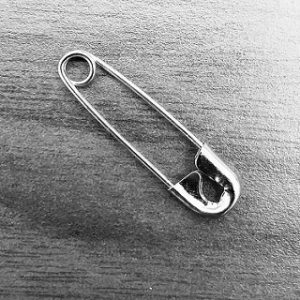
Twenty years ago, when I witnessed a disturbing racist encounter, I miserably failed the safety pin test, long before there was a movement.
I’m ashamed of myself.
As a lifelong, peace-loving do-gooder, I say bravo to the swelling ranks of safety pinners, who silently repudiate our President-elect’s racist and xenophobic campaign rhetoric and declare themselves a “safe” space for anyone who feels frightened or threatened. The pin-wearer pledges to protect, help and defend anyone, minority or not, who is verbally or physically attacked.
I applaud the safety pin movement. But I also know how hard it is to intervene when faced with an unexpected confrontation.
I was riding the trolley on my way home from work when I vaguely noticed that a young black man entered the front of the car and sat in the first available seat. A few stops later, an old white woman got onto the trolley. The young man immediately jumped up and politely offered his seat to her. To my surprise, she screamed at him to get away. She called him foul racist names and accused him of trying to steal her purse.
This poor young man looked stricken. “Lady,” he pleaded. “I’m on my way to work.”
But that didn’t stop her. She looked at him with seething hatred and disgust and continued to scream obscenities at him. Everyone on the trolley, stunned by the suddenness of this altercation, watched this old racist hag verbally abuse a man whose biggest offense was that he tried to be kind to a hell-bent, bigoted she-fiend.
No one said a word, not even the trolley driver, who was only a few feet away and was probably watching the confrontation in his rearview mirror. Somebody could have told her to shut up and get the hell off the trolley. But nobody said anything.
Not even me.
Why? I always believed I was the kind of person who would be the first to jump to the defense of the defenseless. I have no excuse, but all I can do is describe my reactions at the moment.
Shock – nothing eventful ever happens on the trolley. Commuters sit, stand, sleep, read, plug their ears with headphones and rarely talk. So, when my usual mind-numbing commute was interrupted with screaming, swearing and rage, it stunned me and took a minute to process what was going on.
Confusion – I didn’t understand why nobody said anything. I expected and kept waiting for the trolley driver to intervene, but he didn’t and I couldn’t understand why. All of this is going through my head like a jumble and it paralyzed me.
Fear – yes, I was afraid. I was seated by the window near the back in the trolley car. I would have had to shout to be heard. I was afraid of stoking the conflagration. I feared that I was the only one on that trolley who thought that woman’s behavior was sickening and reprehensible. I feared that people would turn on me.
Shame – when that young man turned and looked at everyone on the trolley, probably hoping for support, his expression was filled with such pain, frustration and anger, that I felt furious and ashamed of myself for being silent and cowardly.
The truth is that up until that moment in my life, I had never witnessed an example of blatant racism like that. As a kid who grew up during the Civil Rights movement, I knew that events like this and far worse happened every day. I read about it in history books, newspapers and magazines. But the examples of racism I personally witnessed were a more nebulous kind… degrading jokes, insensitive or inflammatory comments that the speaker would never actually say to a minority’s face.
I’ve thought of that man many times of the last twenty years. I’ve thought about the other people on that trolley and wondered how many felt the same way I did. I’ve wondered if I would have reacted differently if someone else had spoken up first. I wondered why I couldn’t have been the one to break that repulsive, immoral silence.
So here’s the reality. A safety pin is only a symbol of our best intentions. We all hope and think that we will do the right thing.
I’ve had a long time to think about my failure. I’ve cried and asked God’s forgiveness for failing to stand up and do what’s right. I’ve wished that there was some way I could apologize to that man.
After failing so badly, I vowed that I would never let it happen again. Next time, I promise I will speak up.
I don’t need a safety pin.
***
photo credit: Dusty J <a href=”http://www.flickr.com/photos/55608722@N06/30883657156″>Safetypin</a> via <a href=”http://photopin.com”>photopin</a> <a href=”https://creativecommons.org/licenses/by/2.0/”>(license)</a>

10 Comments
I vow right along with you Ann.
I vow right along with you Ann.
When I was in college, back in the dark ages, Cal State L.A. was about 30% white, 30% black, and 30% Hispanic. The other 10% was Asian and “other.” I took a folk dance class for P.E. (required at the time). The class had two black students–a girl and a guy. The girl could have been a professional dancer. The guy had two left feet. I took pity on the guy, and we danced together. Before the end of the class, the teacher took me aside and told me to dance with one of the other guys. When I asked who my current partner would dance with, she named the black girl. She threatened a lower grade for me because “he doesn’t allow you to dance well.” This all made no sense at all to me, so I did nothing about it.
It wasn’t until a few years abo I realized she followed through with her veiled threat. i got a “B” in the class. I deserved an “A.”
When I actually thought about the incident (which I’d forgotten for many, many years), I just felt proud that I stuck with what I thought was right. On the last day of class, Tony (I think that was his name) stopped me to thank me for taking the time with him.
At the time, it just seemed right. Looking back, it seems even more right.
Wow. Your experience highlights how prejudice weaves so easily into our interactions. You did the right thing. Thanks Lorna. The B was worth it.
When I was in college, back in the dark ages, Cal State L.A. was about 30% white, 30% black, and 30% Hispanic. The other 10% was Asian and “other.” I took a folk dance class for P.E. (required at the time). The class had two black students–a girl and a guy. The girl could have been a professional dancer. The guy had two left feet. I took pity on the guy, and we danced together. Before the end of the class, the teacher took me aside and told me to dance with one of the other guys. When I asked who my current partner would dance with, she named the black girl. She threatened a lower grade for me because “he doesn’t allow you to dance well.” This all made no sense at all to me, so I did nothing about it.
It wasn’t until a few years abo I realized she followed through with her veiled threat. i got a “B” in the class. I deserved an “A.”
When I actually thought about the incident (which I’d forgotten for many, many years), I just felt proud that I stuck with what I thought was right. On the last day of class, Tony (I think that was his name) stopped me to thank me for taking the time with him.
At the time, it just seemed right. Looking back, it seems even more right.
Wow. Your experience highlights how prejudice weaves so easily into our interactions. You did the right thing. Thanks Lorna. The B was worth it.
I have a theory of what might have happened. It was so sudden and very surprising to everyone. Nobody expected a random old lady (who was probably off her meds and her rocker at the time) to spring up of nowhere and bicker about her problems to a young man. Passengers probably did want to help but didn’t know what to say or do around the time. I’m certain that everybody feels this way afterwards, the anxiety and the guilt, becoming frustrated and mad that they didn’t do anything around the time, wishing that they could’ve done more. Maybe, this experience, like so many others who observed this happening before, will help people think more on what to do and how to react next time they see someone who’s in distress. So, don’t be too hard on yourself. There’s still so much good we can do to help others be safe and to let them know we still care.
I think your theory is absolutely right. I felt guilty for many years because to me it was such a black and white moral failing. I’m serious when I say I cried over this incident. Many times. I agree there is much good we can do, and having learned a hard lesson in the past, take that responsibility seriously. Thank you so much for your thoughtful response.
I have a theory of what might have happened. It was so sudden and very surprising to everyone. Nobody expected a random old lady (who was probably off her meds and her rocker at the time) to spring up of nowhere and bicker about her problems to a young man. Passengers probably did want to help but didn’t know what to say or do around the time. I’m certain that everybody feels this way afterwards, the anxiety and the guilt, becoming frustrated and mad that they didn’t do anything around the time, wishing that they could’ve done more. Maybe, this experience, like so many others who observed this happening before, will help people think more on what to do and how to react next time they see someone who’s in distress. So, don’t be too hard on yourself. There’s still so much good we can do to help others be safe and to let them know we still care.
I think your theory is absolutely right. I felt guilty for many years because to me it was such a black and white moral failing. I’m serious when I say I cried over this incident. Many times. I agree there is much good we can do, and having learned a hard lesson in the past, take that responsibility seriously. Thank you so much for your thoughtful response.